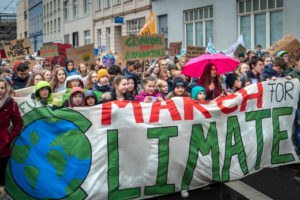The Stories We Tell: Making Climate Change Conversations Less Awkward
How shifting narratives can make climate change a more approachable topic
There’s a lot of upsides to living at home during university, which for me include a short commute, money saved on rent, and perhaps most importantly, home cooked meals that aren’t instant ramen. One drawback, however, has been weighing on me recently—the discomfort my family experiences when I bring up climate change. Because of my studies and personal interests, sustainability and climate change have become frequent talking points when spending time with friends, classmates and family members. While my news story or piece of research is sometimes met with interest, it is more often followed by uncomfortable silence and a hasty subject change, especially at large family gatherings. I’m not the only one experiencing this problem: even climate scientists get pushback when discussing their area of work with others.

Why is climate change such an uncomfortable topic for many? For starters, the crisis is often framed as inevitable. Some have compared discussions of climate change in media coverage to the story of Frankenstein’s monster, an unstoppable villain of humankind’s own creation. In fact, one survey states that 14% of people worldwide believe we are doomed in the fight against climate change. It’s no wonder that the crisis is so overwhelming it seems easier to ignore it than to talk about it.
Although it may seem inevitable for things to get gloomy when discussing dramatic changes to our environment, it’s possible to make the subject more approachable. Here are three ways to shift the narrative about climate change and make talking about it a little less daunting:
Make it Personal

Charts and figures may be effective in the classroom, but they aren’t always a great means to get people listening. Rather than dive headfirst into a discussion about climate science, it’s important to connect with others over shared values. Finding common ground allows you to focus on issues that matter most to the person you’re talking with, and helps to position climate change as a personal matter as well as an environmental one. Sharing your personal connection to climate change will also help others understand your interest in discussing the subject.
Localize Research
If your courses relate to climate change and you’re really itching to discuss the research, there are ways to make it more accessible. Instead of focusing on abstract depictions of climate change effects in the future, discuss things that are happening to people here and now. When relaying what you’ve learned, connect to changes that have affected us locally to help make this research tangible. Local issues like the forest fires in BC’s interior and the shrinking snowpacks that replenish Metro Vancouver’s reservoirs are a great place to start when discussing research on temperature change and drought risk.

Celebrate Action
Lastly, one easy way to reframe conversations about climate change is to bring up the efforts being made to combat it. The achievement and actions of others are a great reminder that our own actions are meaningful. A fantastic example of an individual driving action is Greta Thunberg, whose Fridays for Future climate strikes started as a solo venture but are now a worldwide phenomenon. By focusing on solutions and telling stories that drive hope, others may be encouraged to learn more about the cause.

The climate crisis may be overwhelming, but that’s why it’s so important to talk about. Next time climate change comes up in conversation, let these strategies inspire the story you tell; they have helped me immensely in making climate change conversations approachable for family and friends.
Jamie Hill
